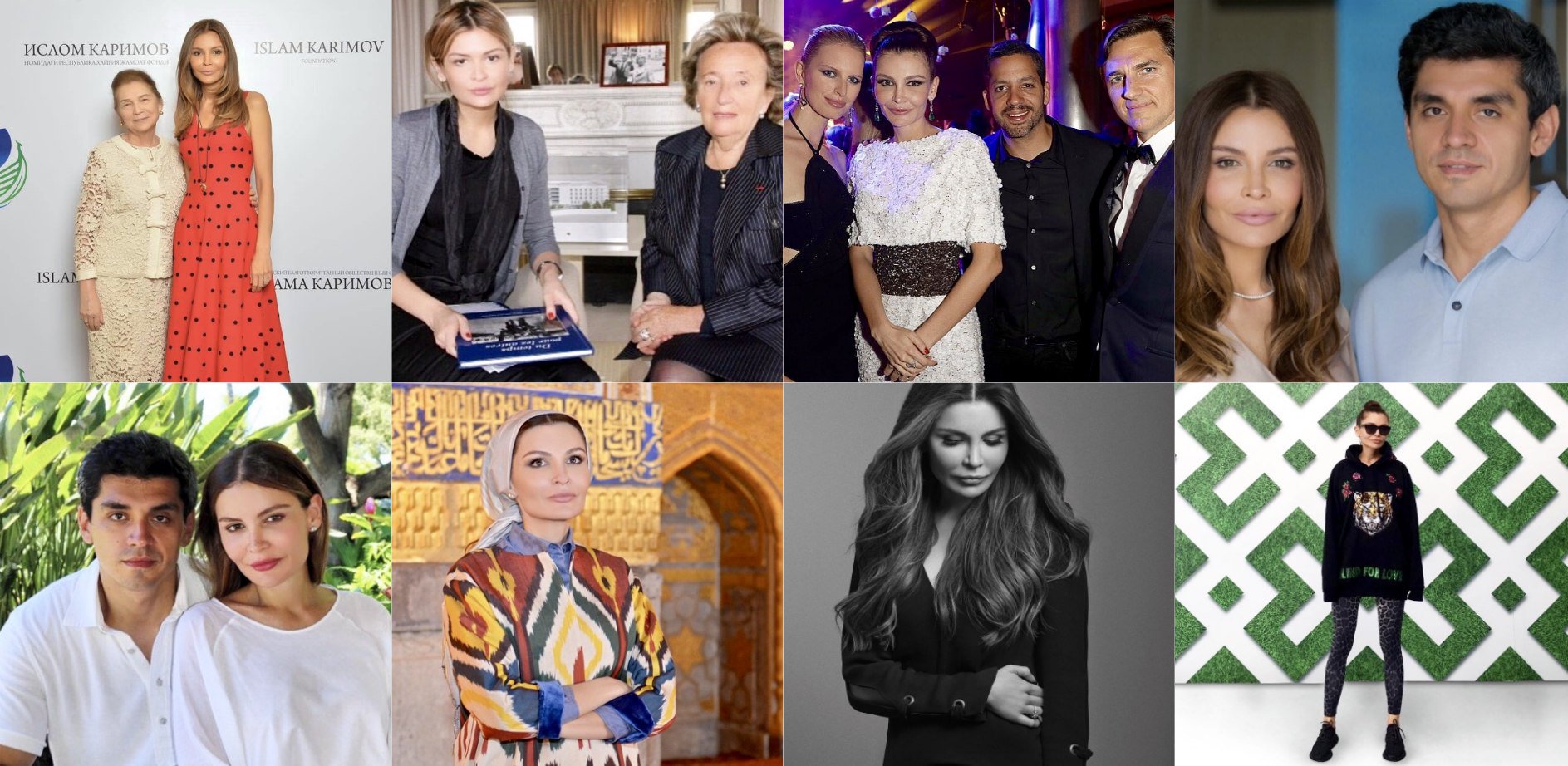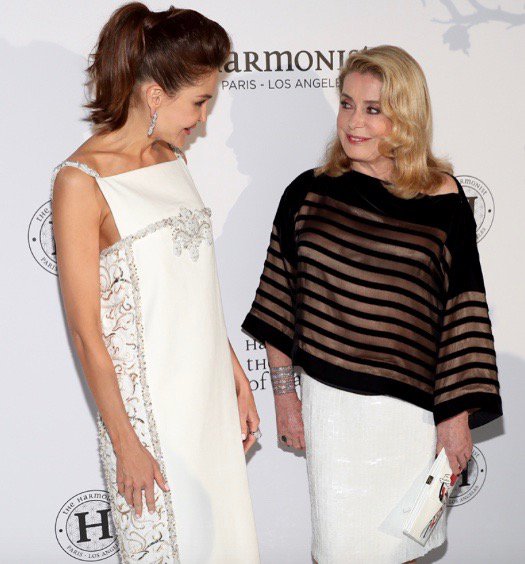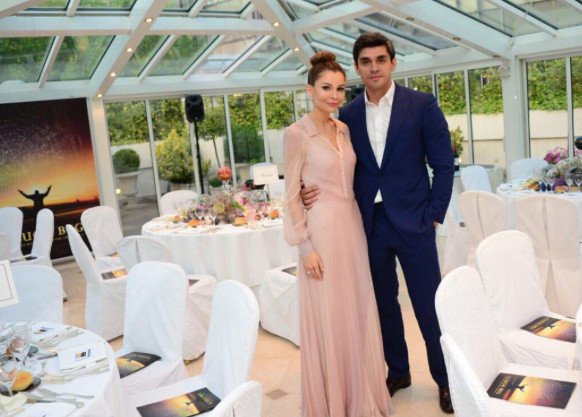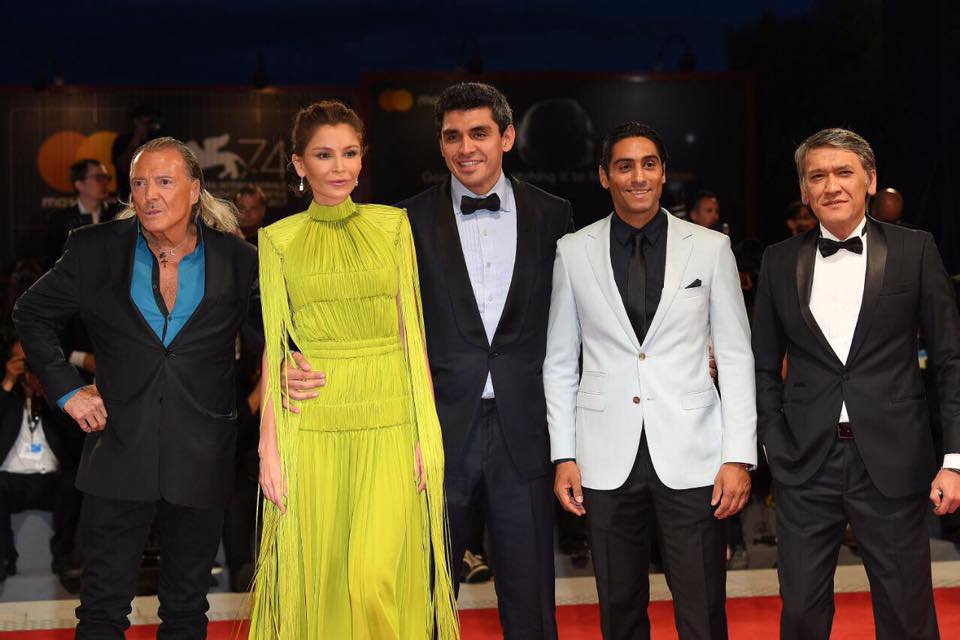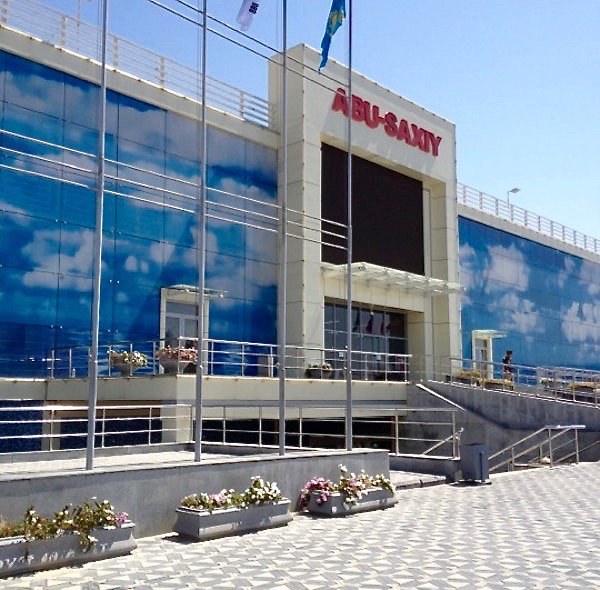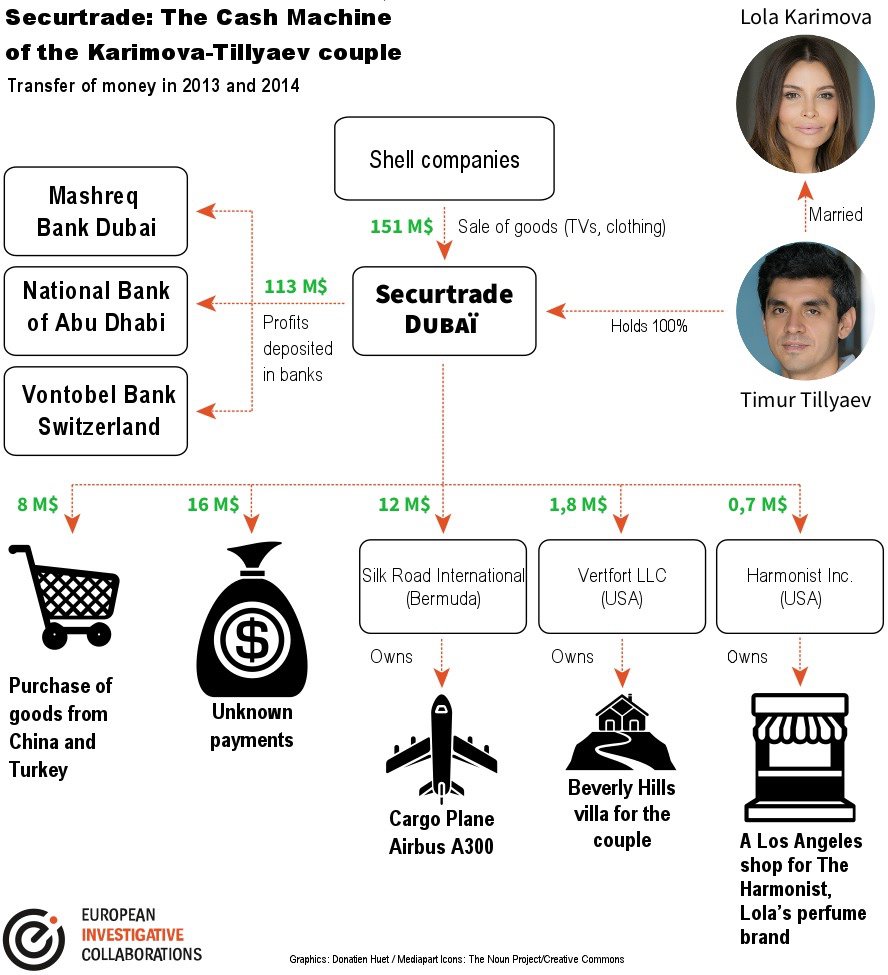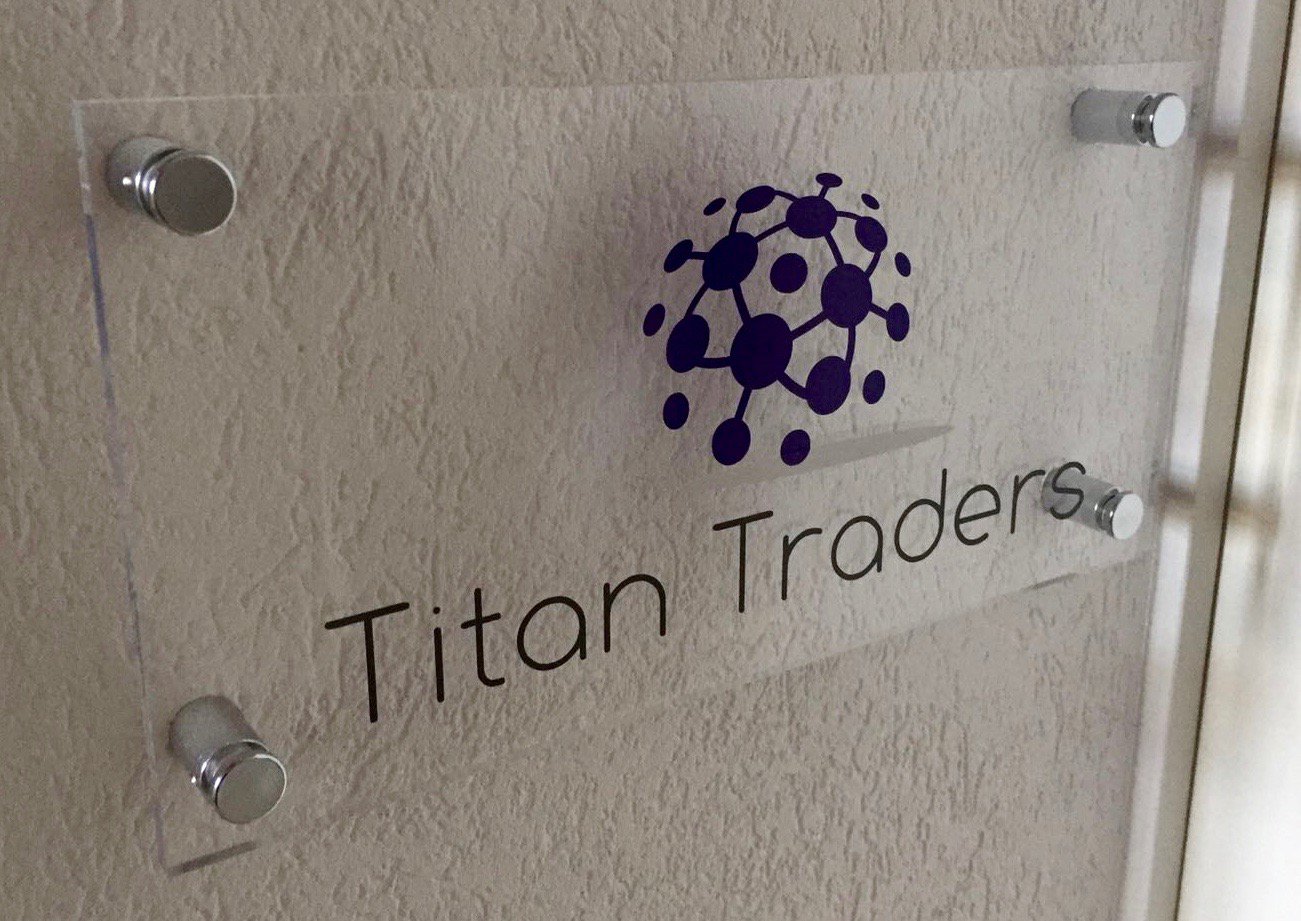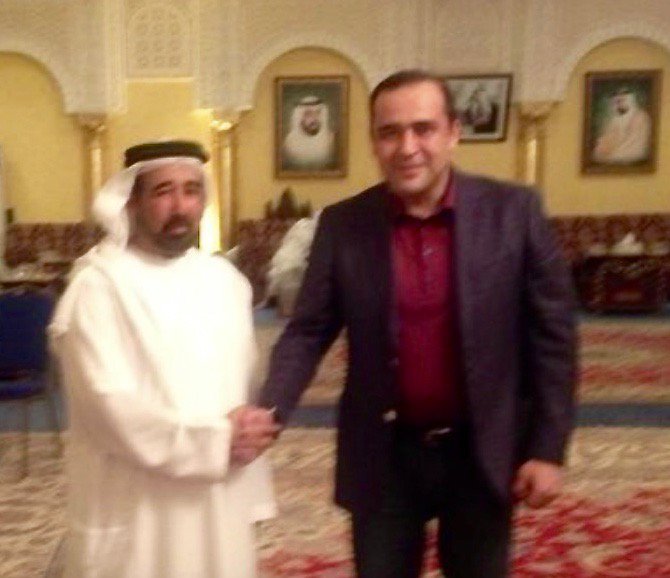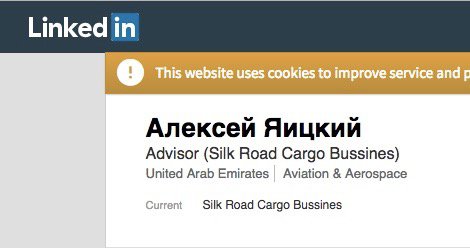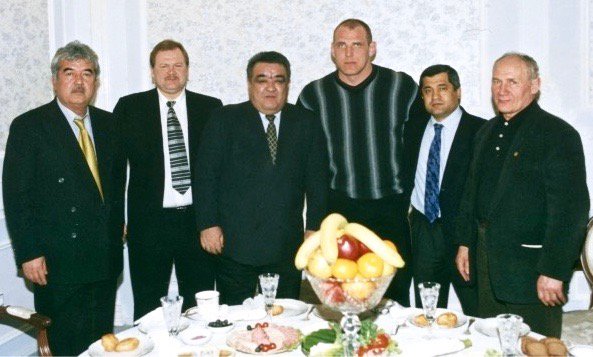- Daughter of deceased Uzbek leader Islam Karimov, Lola Karimova, and her husband Timur Tillyaev are top socialites in Paris and Los Angeles
- The Uzbek couple own a perfume boutique in Melrose Place and a 50 million USD villa in Beverly Hills
- This year, they produced an award-winning documentary at the Venice Film Festival, and Lola was profiled for high society bible Vanity Fair
- Their wealth comes from a market for imported goods in Uzbek capital Tashkent which is suspected of benefiting from tax privileges, a charge which they deny
- In 2013 and 2014 alone, 127 million dollars of cash in their company transactions was channelled through offshore bank accounts in the United Arab Emirates and Switzerland, through a complex financial scheme, our investigation reveals
- Former collaborators of a leading Uzbek ‘mafia boss’ held and still hold key positions at the couple’s business
This year’s Cannes Film Festival was a triumph for Lola Karimova-Tillyaeva. To promote her perfume brand ‘The Harmonist’, the youngest daughter of the former Uzbek president Islam Karimov held one of the Riviera’s grandest social events.
On 22 May, she rented Club Albane on the rooftop of the JW Marriott Hotel, the festival's most exclusive venue, for the first edition of ‘The Harmonist Excellence Award’, where she personally handed the top prize to Oscar-winning French actor Juliette Binoche.
The 102 illustrious guests also included actors Catherine Deneuve and Kristin Scott Thomas - as well as 90s pin-up Pamela Anderson.
Together they enjoyed Champagne cocktails in the balmy atmosphere, a gastronomic dinner called ‘scents of harmony’ and a private concert by ‘Kiss from a Rose’ singer Seal.
Lola Karimova, 39, is a big spender at Cannes. Last year, she rented the entire beach of the Martinez Palace for performances by American pop sensation Jason Derulo and DJ Martin Solveig.
Before this event, Lola blasted a TV advert for her perfume on a giant screen in front of a crowd that included stars Orlando Bloom, Kate Hudson and Mélanie Laurent, top models Karolina Kurkova and Heidi Klum and Ivana Trump, the ex-wife of the US president.
Dizzy on Champagne and taking in the luxury air, these celebrities had no qualms about promoting the image of the daughter of the former president of the Central Asian state of Uzbekistan, Islam Karimov.
The leader brutally ran the country as a kleptocracy for his inner circle for over two decades until his death in September 2016, suppressing dissent with violence and torture, and muzzling the press.
According to our information, several guests were paid to attend the parties in Cannes, including Juliette Binoche and Catherine Deneuve. But the PR officer for these actresses said they did not know Lola Karimova, and were not aware that she owned ‘The Harmonist’ brand. Representatives of Orlando Bloom, Pamela Anderson, Kristin Scott Thomas and Mélanie Laurent did not reply.
But they did not seem too concerned about the origin of the immense fortune behind the perfume, which amounts to several hundred millions of dollars, and hails from a 32-million strong state of farms and mines, where children are enlisted into forced labour in cotton fields.
The business of Lola Karimova-Tillyaeva, managed by her husband Timur Tillyaev, is less glamorous than an evening of testing a 285-dollar elixir, while knocking back the fizz to a live soundtrack from the latest R&B hitmaker.
Confidential documents, obtained by Mediapart and shared with the media network European Investigative Collaborations (EIC) show that the couple accumulated, in 2013 and 2014 alone, 127 million dollars hidden in offshore bank accounts in the United Arab Emirates and Switzerland, through a complex financial scheme.
Dubai Trading Hub: Heart of Scheme
At the centre of the system is trading company Securtrade, registered in Dubai. It sells imported consumer goods, such as clothing and televisions, to other trading companies which supply Tashkent's main wholesale market, Abu Sahiy. This market is owned by Timur Tillyaev, and is suspected of benefiting from tax privileges, a charge which the businessman denies.
Another issue is that Securtrade undertakes most of its business with dozens of shell companies registered in tax havens. The EIC also noted anomalies in invoices and transport documents, which suggests that some transactions could be fake.
Above this mysterious business hangs the shadow of Uzbek mafia boss Salim Abduvaliyev: two of his former collaborators have held key positions at the head of Timur and Lola’s companies in the United Arab Emirates.
The multi-millionaire Uzbek couple would not speak to EIC. Instead their American lawyer, Mark F. Raymond, states, in a written answer, that our information is “groundless”. “Mr. Tillyaev’s businesses are legitimate and have not engaged in illicit activity.” He adds that he is “confident” that our documents “are either stolen or fabrications”, and that they have been provided by a “disgruntled, biased, and reckless former consultant” in conflict with Timur Tillyaev, who “has been discredited”.
Raymond adds: “Know that the publication of any defamatory article will result in our clients pursuing all lawful remedies against you and all those who aid you in such wrongful conduct.”
U.S. Cables: Lola the Ex-Nightclubber
Gaining detailed and accurate information about Uzbek politics and its elite is almost impossible. The press is under constant attack, and even dissidents living in foreign countries are afraid to speak, because their families in Uzbekistan can face threats and intimidation.
But there is information about Lola Karimova’s past from American diplomatic cables from 2004, published on Wikileaks. The president’s younger daughter, then 26, is described as a nightclubber, driving every night at the wheel of her Porsche Cayenne, to the most chic venue in Tashkent. The cable says that she drank alcohol and “danced freely” until the end of the night with her “thuggish-looking” boyfriend and future husband Timur Tillyaev, an owner of bars and restaurants in the capital of the Muslim-majority country.
In 2006, Lola Karimova left Uzbekistan and settled briefly in Riga, Latvia. With her husband, she moved to Paris and to Switzerland, where they bought a 30 million Euro property in 2010 in the poshest suburb of Geneva. Three years later, Timur and Lola purchased a mega-villa worth around 50 million dollars in Beverly Hills, Los Angeles.
In a recent interview for a puff piece in Vanity Fair promoting her perfume brand, Lola says that she shares her time between her main LA residence and Paris, where she works for her perfume company and as an ambassador of Uzbekistan to Unesco, a post she held from 2008 and is likely to relinquish soon. She also runs several charities, like the ‘You Are Not Alone Foundation’, which supports Uzbek orphans.
A pillar of Parisian social life, Karimova works to improve the image of the Uzbek regime, which is most notable in the international press for the ‘Andijan Massacre’ of 2005 - where its security services fired on a peaceful protest, killing hundreds of demonstrators, before burying them in mass graves. The authorities also had a penchant for boiling alive their prisoners.
Accessing Parisian high society does not come cheap. French magazine Bakchich [now defunct] revealed actor Monica Bellucci was paid 190,000 Euro in 2009 to attend Karimova’s so-called ‘Humanitarian’ dinner, featuring French movie veteran Alain Delon and Bernadette Chirac, the wife of former French president Jacques Chirac.
Lola also acted as a guardian of her father, suing, without success, an article by news website Rue89, which described her as a “dictator’s daughter”. In November 2016, two months after her father's death, she founded the Islam Karimov Foundation, the purpose of which, alongside charity work, is to “perpetuate the memory and principles” of the former president.
To further show her patriotism to the Uzbek cause, she also produced a documentary about an Uzbek astronomer ‘Ulugh Beg: Through Hardships to the Stars’, with American actor Armand Assante in the lead role, and former Mr Bellucci - Vincent Cassel - as narrator. This movie won the ‘Kineo’ Prize for Best Foreign Documentary at this year’s Venice Film Festival.
Lola Karimova distances herself from her sister Gulnara, a former pop singer and businesswoman who has been prosecuted since 2012 in five countries for receiving 340 million USD in bribes from foreign firms to obtain mobile phone licences in Uzbekistan.
In 2014, Gulnara was placed under house arrest in Uzbekistan by her own father and, since last summer, has been in jail, with an Uzbek prosecutor accusing her of hijacking a total of 1.5 billion USD. In 2013, shortly after Gulnara's first legal troubles, Lola Karimova told the BBC that she had “no family or friendly relations” with her sister, and they had “not spoken to each other for 12 years.”
Lola Karimova is discreet about the origin of her wealth. In the same BBC interview, she merely declared that her husband “is a shareholder in a transport and trading company”.
According to our documents, the wealth of the couple comes from Abu Sahiy, a huge 25-hectare wholesale market of consumer goods in the suburbs of Tashkent. Founded in March 2006 by Timur Tillyaev, after his romance with Lola began, Abu Sahiy has become the largest trading centre of imports in Uzbekistan.
The deceased president's son-in-law also owns the Silk Road group of companies, an air cargo business company closely linked to Abu Sahiy, and headquartered a few hundred metres from the market.
According to reports by media often critical of the regime, including Ferghana and Centr-1, Abu Sahiy‘s success is based on an unofficial tax and customs privilege, and possibly paying no customs duties.
Duties and taxes on imported goods in Uzbekistan are punitively high for consumers and merchants, but there is a cheaper route. Abu Sahiy consists of a transport ‘system’ which brings in products by plane and lorry from abroad, often from China and through Kyrgyzstan. Merchants buy into the system to allow them to import goods into Uzbekistan, without paying the customs’ duties themselves, it is understood.
In an interview with Turkish newspaper Hürriyet, Gulnara Karimova, said that Abu Sahiy is “without any tax obligations to the state budget” and has “a monthly turnover of around 20 million dollars”, or 240 million dollars a year for Timur Tillyaev.
But the firm’s bypassing of the legal route is denied by Tillyaev's American representative.
Mark F. Raymond points out that “Abu Sahiy’s premiere position” and its “lower” prices is only “the result of a well-organized business with a high standard of technical and logistics skills… The conduct of business is in compliance with all laws, including the payment of all taxes and duties. [Abu Sahiy] has never enjoyed any special customs privileges or undue tax exemptions.”
Dubai Firm: Massive profit of 85 per cent on clothing and TV sales
Lola and her husband use a complex offshore trading system, which results in money transferring from Uzbekistan into their companies in tax havens.
In early 2013, Timur Tillyaev created the import-export company Securtrade in Dubai, of which he is the sole shareholder. He entrusted the management to fellow Uzbek collaborator Alimbekov Dovronbek, an engineer and champion of Uzbek martial arts.
Here we detail a chain of businesses in multiple jurisdictions: Securtrade buys products in China or Turkey, then sells them to other trading companies, which sell them to Scottish shell companies, which further sell them on to the merchants of Abu Sahiy market.
Documents obtained by EIC suggest that this scheme is shady. First, there are the stupendous profits of Securtrade.
Its bank records for 2013 and 2014 show that the company achieved, over this period, a minimum of 127 million USD in profit on a turnover of 151 million USD.
That makes a hallucinatory net gain of 85 per cent, which seems out of reach for a company that sells low margin products such as TV sets and clothes.
Some of this money has financed the couple's activities and personal expenses. 12 million USD was wired to Silk Road International, a company in Brunei which owns the couple’s Airbus A300 cargo plane. Securtrade also paid 1.2 million USD to Vertfort LCC, the American company that owns the couple's villa in Beverly Hills, and 675,000 USD to Harmonist Inc., the U.S. company operating Lola's Harmonist boutique in Los Angeles.
The remaining cash, 113 million USD, has remained in the company’s accounts at Mashreq Bank in Dubai, and at NBAD Bank in Abu Dhabi, while 20 million USD has been transferred to an account at the Swiss bank Vontobel, through a Swiss assets management company called CPCI.
Because this is complicated, here is a diagram that sets this out:
The question remains: how can Securtrade achieve such huge profitability?
Well, it seems that this Dubai company of Timur Tillyaev sells products, but rarely buys them.
In its 2013 and 2014 bank records, there are 151 million USD of sales, but only eight million identified as payments to suppliers, almost twenty times fewer.
In its annual financial statements, Securtrade states it has bought 92 million USD worth of products during the same period, but adds that it accumulated a trading debt of 79 million USD owed to its suppliers at the end of 2014.
This means that Securtrade only paid out 13 million USD from 92 million. Financial experts say that a seller in such a transaction would not put up with owing such a high debt to a client, as these payments are usually cleared in a maximum of three months.
So this raises a doubt about the reality of these business deals - an issue which Timur and Lola’s lawyer refused to explain publicly. He only stated that Securtrade’s financial statements are “appropriate and above-board.”
Securtrade’s customers are equally troubling. The company makes almost all of its sales with shell corporations that have no offices or employees.
At the top of the chain, Securtrade’s final customers are, according to Tillyaev’s lawyer, traders who sell goods to “vendors at Abu Sahiy and other markets”.
But all these merchants keen to work in Central Asia have - bizarrely - chosen to set up their businesses in Scotland, more than 5,000 kilometres from Tashkent.
Uzbek Trading Hotspot: A Village in South Lanarkshire
The three trading customers of Securtrade are named Elcorp, Five Star Technology Support, and Greenhall Management.
These are ‘Scottish Limited Partnerships’, a controversial status that allows them to keep the secrecy of the owners with the same lack of transparency as the most notorious tax havens, but with the respectable facade of a British company.
Securtrade’s final customers are based in a room in a central Edinburgh block, and a townhouse in the village of Douglas, in the county of South Lanarkshire. This village became famous when one of the 2,662 companies registered at a Main Street address was in a criminal probe due to arms sales concerning Ukraine and the United Arab Emirates.
Behind the Scottish companies trading with Lola Karimova's husband is the same Dublin-based fiduciary firm Kearney Curran & Co [which refused to answer our questions, or comment on the phone], and the same British men acting as nominee directors.
Two of these names administer over 2,000 companies, earning them the status of being the most active straw men in Europe.
In short - this scheme is commonly used to conceal the real owners of these companies.
In Edinburgh, John Hein, who is registered at the address of Elcorp Management, confirmed that his company set up “a mailbox service” for this trading firm, and that he forwarded any letters to Dublin. Elcorp has no personnel at the address.
In Douglas, a similar forwarding company called Office Wizard, also confirmed 'Five Star Technology Support' has no presence at its address. “We rent virtual space to companies who are based out of the UK, but wish to operate in the UK,” said Office Wizard's Lily Clark. “They can operate anywhere in the world.”
Another coincidence: all these 'Scottish LPs' opened accounts in the Latvian bank Rietumu in Riga. This bank has a poor reputation, and was recently hit with a 80 million Euro fine from France for money laundering and tax evasion [Rietumu refused to answer questions from EIC, or comment].
Chasing the Ghost Firm of Switzerland
These Scotland-based merchants buy the goods from other trading companies based in Switzerland or the United Arab Emirates, who buy from Securtrade.
But in reality, these intermediary companies are empty shells. Their only aim is to serve as a buffer between Securtrade and its Scottish 'clients'.
One of these, Swiss company Titan Traders, went to great lengths to create a façade. Its headquarters is in a building in the center of Luzern. Upstairs, Titan has his own door and a glass sign with its name and a generic logo. In reality, behind the door are the premises of a trust company, which has its own entrance only a few meters away.
When we visited the location, and knocked on Titan's door, an employee of the trust company told us, without possibly understanding the irony of the statement:
“There's nobody working for Titan here, it's just their head office.”
Titan has its bank account at ABLV bank in Riga. It is owned by Patrick Gruhn, a Swiss businessman with multiple interests, who presents himself as a wealth manager. He admits that he knows Timur Tillyaev, but swears that it created a trading business with Uzbekistan "on his own accord and not under instruction of Mr. Tillyaev".
In reality, Titan works only with Securtrade, and Gruhn's main job was to sign contracts and invoices, in exchange for commissions amounting hundreds of thousands of euros. Gruhn's spokesman says that Titan “has now been dormant for nearly two years”.
Patrick Gruhn has also lent, through Titan Traders, 350,000 Euro to the French company which manages the Paris boutique The Harmonist, the perfume brand of Lola Karimova, located on the exclusive George V Avenue near the Champs-Elysées. Gruhn says that the loan has been fully repaid.
Gruhn says that Titan’s role was to ensure that the Scottish ‘merchants’ would not bypass Securtrade, and buy "directly from the initial Chinese supplier".
Timur Tillyaev’s lawyer asserts that the use of these intermediary companies “is commonly used by companies all over the world, not for nefarious or improper reasons, but as a sound, prudent and legitimate business practice”. He adds that Securtrade “has been the subject of intensive third party reviews and audits”, but he did not show these analyses to EIC.
Invoices which Predict the Future
Our documents, however, reveal several problematic transactions. In one example, in November 2013, Securtrade bought five batches of clothes from a Chinese exporter, Xinjiang Bortala. Then Securtrade sold the goods for nine million USD to Titan, which resold them to Scottish shell company Five Star.
But the documents obtained by EIC suggest that there could be no real trading of goods behind this money flow. In most cases Titan resells the clothes to Five Star, before it even buys them.
Invoices issued by the Chinese supplier to Securtrade do not have a company header or signature. One of the Xinjiang Bortala invoices mentions the resale of the products by Securtrade to Titan, on a date which happens two weeks after the date written on its invoice. In other words, it reports a sale which happens in the future.
The clothes have been shipped by trucks from China to the Abu Sahiy market in Tashkent. But there are problems with the transport documents. They have the stamp of the Uzbek customs, but were not filled in correctly: most of the mandatory fields were left blank, including export license numbers, truck departure and arrival dates, and commodity prices.
In response, Timur Tillyaev’s lawyer asserts that Securtrade only carries out “legitimate, legal transactions of actual goods”.
“To the extent that non-falsified, actual company documents may reveal an error in any one of those transactions, we acknowledge that no company is 100% perfect, and we do not claim that SecurTrade is the exception,” adds Mark F. Raymond.
The activities of Timur Tillyaev in the United Arab Emirates raised suspicion among the authorities. In May 2013, following a denunciation by the central bank, the Sharjah police launched an investigation into Silk Road FZE (one of the companies in Tillyaev’s business galaxy) on suspicion of money laundering. The two Uzbek managers of the company were questioned and their passports confiscated. But they were eventually allowed to leave the country.
A coincidence - On 8 September 2013, the manager of Securtrade, Alimbekov Dovronbek, had the privilege to meet the Sheikh of Sharjah, Sultan bin Muhammad Al Qasimi, in his palace. According to our information, the henchman of Timur Tillyaev offered a Rolls Royce to the sheikh. Timur Tillyaev says that he is “unaware” of this episode and that his companies “do not engage in any bribery or corrupt activities”.
A year later, another company in Timur Tillyaev’s network, Silk Road Cargo, based in Dubai, was under investigation. In October 2014, the Uzbek director of Silk Road Cargo, Aleksey Yaitskiy, is arrested and imprisoned for corruption in Dubai, for offering 100,000 Euro of bribes to an Emirate official. He was eventually allowed to leave the country.
Tillyaev's lawyer says that Yaitskiy “was not acting on behalf of the company” and that he was immediately dismissed. Despite this incident, Yaitskiy was appointed shortly afterwards to the Uzbekistan Airways office in London [Today the airline confirmed Yaitskiy worked there, but state he left the company some time ago].
Now Yaitskiy is on LinkedIn, where his only job listed is 'advisor' to Silk Road, the name of Tillyaev's firm.
Mafia Boss’s Former Collaborators Connected to Dealings
Timur Tillyev picked collaborators with a past connected to organized crime. According to EIC sources and media reports, Aleksey Yaitskiy and the director of Securtrade Alimbekov Dovronbek, are both close and former employees to the senior Uzbek godfather, Salim Abduvaliyev, known as ‘Salimboy’.
Aged 67, Abduvaliyev is described as a “mafia chieftain” in a U.S. diplomatic cable published by Wikileaks. Close to the former dictator and father of Lola, Islam Karimov, he is described in this cable as the man who supervises the bribes paid by foreign investors to access businesses in Uzbekistan. Timur and ‘Salimboy’ have also been described in the press as ‘close’.
“Mr. Tillyaev has no personal or professional relationship with Salim Abdvaliev [sic] and is unaware of any relationship Mr. Dovronbek or Yaitskiy allegedly has or had with him,” his lawyer replies.
The Securtrade system brings in mega profits. Since our documents cover only the years 2013 and 2014, Lola Karimova and her husband have probably cashed in Dubaï much more than the 127 million USD of which we are aware.
Did Lola Karimova and her husband transfer their fortune abroad to protect themselves in the event of political changes in Uzbekistan? Has this system been put in place to reduce their tax bill? Their lawyer says that “Mr. Tillyaev reports his companies in his filings and pays taxes.”
But their wealth could be at risk. On 8 September 2016, less than a week after the death of Islam Karimov, the Uzbek newspaper UzMetronom reported that the authorities had launched an inspection of the Abu Sahiy market on suspicions of tax evasion and illegal use of foreign currency.
According to the Ferghana News website, this ‘operation’ could prepare the transfer of the market to the relatives of the new Uzbek president, Shavkat Mirziyoyev. This is likely to be his son-in-law Oybek Saidov, who is understood to be a director in the Presidential administration.
”[Tillyaev] is not aware of any investigation of Abu Sahiy by Uzbek authorities and remains the 100% shareholder of Abu Sahiy […] more than a year after his father in law's death,” states his lawyer, Mark F Raymond.
In his opinion, this situation “evidences that the business did not benefit from a familial or government-protected status.”
Business empires can rise and fall in Uzbekistan in a matter of weeks, in a country where many of the biggest names in trade are now in exile or prison at home.
Possible scenarios include a struggle or a power-sharing agreement between the families of the former and current ruler.
But in a country as closed as Uzbekistan, it is hard to find proof about where the power lies, and how that power is exercised.
